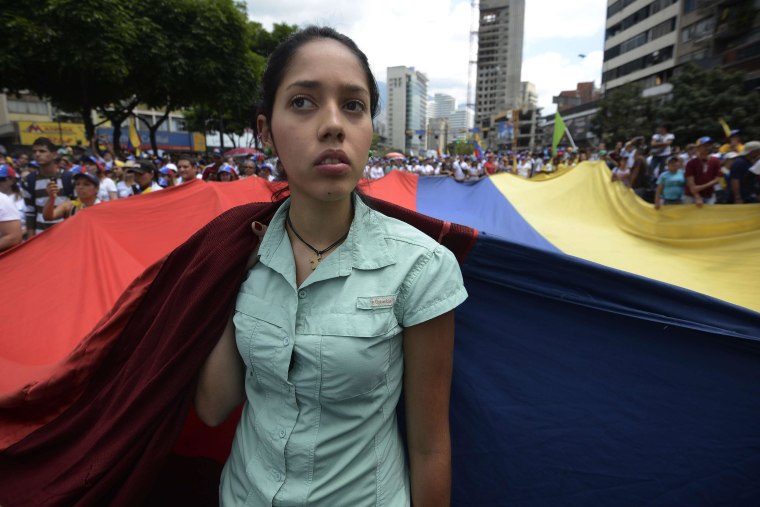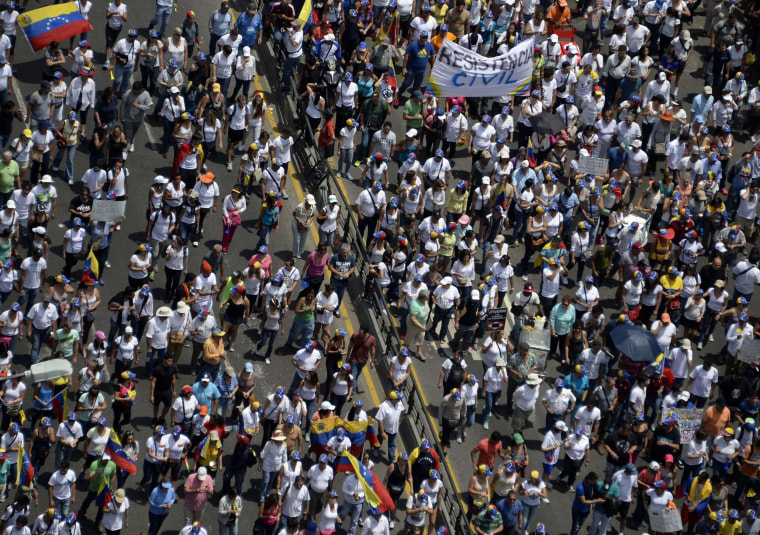In the midst of chaos in Venezuela, a dependent Cuba and its economic future is walking on a tight rope.
As Venezuela's economic woes deepen, with an annualized inflation rate reaching 57 percent, and violent clashes between pro- and anti-government protesters escalate, the probability of a new government is high, making Cuba's future uncertain. Even if Nicolas Maduro, who succeeded the late Hugo Chavez as president, stays in power, he could be forced to cut aid to Cuba to help alleviate Venezuela's imploded economy, which suffers from stagnation, inflation and shortages.
For the last decade, Venezuela's oil has helped fuel Cuba's economy, providing 60 percent of the communist-ruled island's demands. In exchange, Cuba sends about 30,000 doctors to Venezuela, according to an analysis by Pavel Vidal, a former official at Cuba's central bank and now an economics professor at the Universidad Javeriana in Cali, Colombia.
The commercial relationship with leftist Venezuela accounts for 40 percent of Cuba's trade — or 18 percent of Cuba's gross domestic product, Vidal said. If Venezuela were to cut Cuba loose, completely or partially, it could cause Cuba's economy to contract anywhere from 4 percent to 7.7 percent.
"Cuba depends on Venezuela's political situation," Vidal said. "And right now, Venezuela is unpredictable."
Cuba is well aware of its vulnerability, Vidal said, noting that it's not the first time the island nation has found itself facing this type of situation.
Rewind to the '90s, after the collapse of the Soviet Union, when Cuba's economy shrank by 35 percent. The Soviet Union was a major ally and economic subsidizer, accounting for 28 percent of Cuba's economy.
"Cuba today has put all of its eggs in one basket. Before it was the Soviet Union's basket, today it is Venezuela's basket."
Looking only at the numbers, the impact to Cuba's economy without the aid of Venezuela would be far less than the country suffered in the '90s, but that doesn't mean that Cuba's pain would be lessened. In fact, it could be devastating. Cuba's economy is still convalescent and is not prepared for another punch, which, according to Vidal's report, could drive the country into a recession.
"Today, Cuba's economy is in worse condition than in the late '80s to implement an adjustment if it undergoes another shock, and it would be far more complicated to manage," Vidal said.
"It will be an economic disaster," said Jorge R. Piñon, interim director at the Center for International & Environmental Policy at the University of Texas, adding that Cuba would be back to post-Soviet times. "Cuba today has put all of its eggs in one basket. Before it was the Soviet Union's basket, today it is Venezuela's basket."
Cuban economist and journalist Roberto Alvarez Quiñones agrees.
Without Venezuela and its oil and subsidies, "industrial production, trade, transport, agriculture, and the whole economy would be affected dramatically. Medieval nights of the '90s would return, with blackouts of up to 14 hours in some areas," Alvarez Quiñones wrote in a column for Diaro de Cuba.

But there could be a bright side, in the long term, if Venezuela breaks away from Cuba. Cuba's President Raul Castro could be prompted to speed economic reforms he's been pushing and open the door to more foreign capital.
"They are realizing now what can happen if Venezuela disappears, and that they better start changing their model faster than before," said Piñon, a Latin American oil industry analyst.
This month, the Cuban National Assembly is expected to pass a new foreign investment law that would make Cuba more open and flexible to foreign investment.
"Cuba is getting ready for the eventual lifting of the U.S.embargo," Piñon said. "Everyone is prepositioning themselves for a post-embargoed Cuba."
Brazil, an increasingly important partner for Cuba, is already deepening its economic relationships with the island nation with the upgrade of the Cuban port of Mariel, a nearly $1 billion project that is being mostly financed by Brazil. Cuba also has started to supply Cuban doctors to Brazil, where there is a shortage of health-care professionals.
"Everyone is prepositioning themselves for a post-embargoed Cuba."
Brazil is betting on the economic potential the port would bring from traffic between the United States and Cuba through the Panama Canal if the U.S. embargo on trade with Havana is lifted, said Julia E. Sweig, senior fellow for Latin America studies at the Council on Foreign Relations.
"This is a pragmatic and strategic play by Brazil to expand its investment and political, economic presence in Cuba because there's an opportunity there," Sweig said. "It's a bit of a bet because we don't know what the new foreign investment law is going to look like yet. That's going to be a significant indicator of how much opportunity, not only for Brazil, but for other countries, exists in Cuba."
But could new legislation pave the way for Cuba to mend its relationship with the United States?
"I am skeptically optimistic," Sweig said. "I don't think it would trigger any massive changes in Washington's policy towards Cuba until Washington is ready to marginalize the opponents of change in the U.S. Congress."
